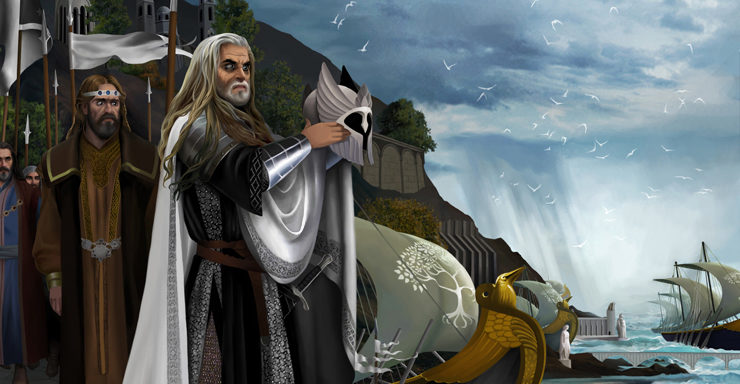Wherein the Last King of the Númenóreans Assumes Control, Puts Númenor First, Keeps His Enemy Close, and Defies Death In the Worst Way Possible
In the first half of the Akallabêth, we learned what made Aragorn’s ancestry so special. The Edain backed the right horse during the War of Wrath and so were rewarded with being damn near Elf-level good at just about everything, and then were given the wondrous island of Númenor to hang out on. They should have lived happily ever after. But see, these so-called enlightened Men on their high horses have been looking the Valinorean gift horse in the mouth. They’re at the top of their game, yet can’t stop themselves from daydreaming about the Undying Lands, a place where they’re sure they won’t get any older, and they won’t ever die—oh, and the one place they’re expressly forbidden to go.
In this half of the tale, we’ll see why Middle-earth still can’t have nice things, and why there aren’t a bunch of Númenóreans still walking around in the time of The Lord of the Rings. The unrest that’s taken root in their proud hearts has already divided them into two polarized political factions: the ever-growing King’s Men and the Faithful. It’s only going to get worse. So let’s get to it. I promise I’ll try to cool it with the horse-related expressions.
Dramatis personæ of note:
- Ar-Pharazôn – Man, the last King of Númenor, a real horse’s ass
- Sauron – Maia, successor to the World’s Greatest Asshole
- Amandil – Man, lord among the Faithful, responsible adult
- Elendil – Man, Faithful son of Amandil, responsible adult
- Isildur – Man, Faithful son of Elendil, uncommon fruit thief
- Manwë – Vala, King of Arda who has a Men problem
Akallabêth, Part 2
Something is rotten in the island of Númenor.
Which seems strange, right? Weren’t these people augmented by the Valar, made more gifted than any other mortals? They’re the most powerful, long-lived Men in the world. But if you ask them, that’s not good enough. When they get old, they…die! Now, in the good old days, they were wiser, they were friendly with the Eldar, and treated others with respect. They remembered where they came from. And when great age was upon them at long last, they would surrender to it. Death, they trusted, wasn’t a punishment. Quite the contrary: it was a ticket to Ilúvatar’s after-party!
But the fear of death grew ever darker upon them, and they delayed it by all means that they could; and they began to build great houses for their dead, while their wise men laboured unceasingly to discover if they might the secret of recalling life, or at least of the prolonging of Men’s days.
So their brightest minds delve for secrets to revive the dead. Like, zoinks! To revitalize dead tissue, basically! Sadly, Tolkien moves too swiftly past this delightful little Frankenstein part of the story. I have so many questions. What did they try? We’re talking attempted necromancy here, aren’t we? Who’s the Herbert-of-the-West trying to reanimate Dúnedain corpses? Suddenly it’s little wonder that three such Númenóreans over on Middle-earth already leapt at the promise of sorcery and immortality and joined the ranks of the Nazgûl.
But man, is that a suck-ass trade: long, vital life with an eventual finality in exchange for “unendurable” yet “unending life.” There is a fine distinction between the two, and the latter cannot be pleasant!
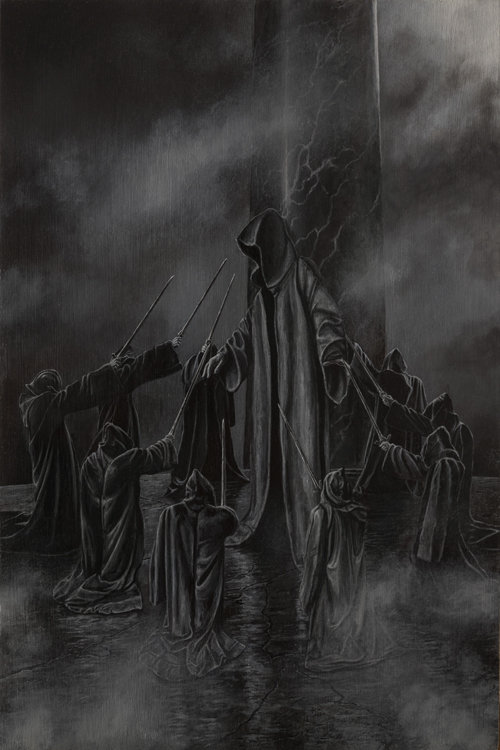
Still, all the island Númenóreans accomplish is getting good at mummifying and interring their dead. And while they lived, they lived in decadence and wealth, always wanting more.
Now, under the twenty-fourth king, Tar-Palantir (“He who looks afar,” à la the palantíri—the Seeing-stones!), the immoral trajectory of Númenor had been checked…a little bit. He was a good king, doing his best to roll back some of the evils committed by the kingdom’s most recent top brass. In his time, the White Tree that flowered in the courtyard—Nimloth the Fair, that was given to Númenor by the Eldar of Tol Eressëa—was tended again. The Faithful, the true Elf-friends, were able to breath once more. And his daughter, Tar-Míriel, is next in line for the sceptre. Good. There’s hope yet for Númenor!
But then comes along Pharazôn, the son of old Tar-Palantir’s jerkface brother, Gimilkhâd, who was himself leader of the King’s Men. Pharazôn decides he should be in charge and that the path to kingship is through Tar-Palantir’s daughter—yeah, Pharazôn’s own cousin. (Who does he think he is—Maeglin?) And, no, it’s not legal to marry your close relative here, but if you aim to be the King of Númenor unlawfully then I guess that’s not stopping you. And so upon her father’s death, Pharazôn “took her to wife against her will,” which, frankly, really sets the fittingly sleazy stage for this bastard in king’s clothing. Now he’s got his cousin (ew) and the sceptre.
Which means he’s got the throne now.
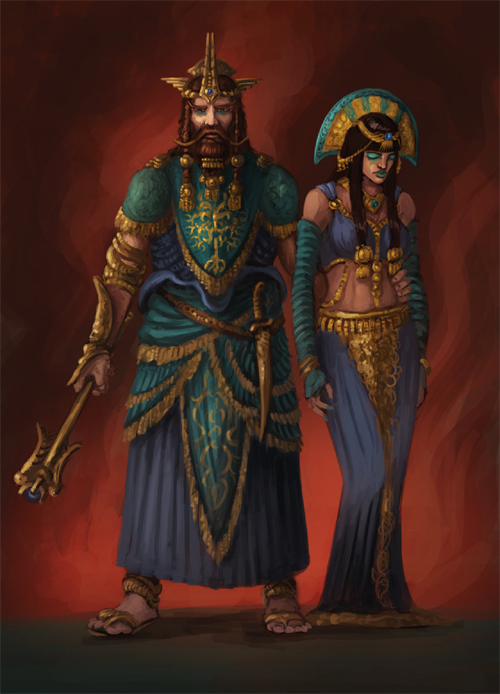
Does anyone have a problem with this? No, he didn’t think so.
Thus the incestuous bastard becomes Ar-Pharazôn, twenty-fifth King of Númenor—which way too many people are apparently okay with, because it benefits the powerful and numerous members of the King’s Men party. But ugh, way to change horses midstream, Númenor. Míriel is even assigned a new and Adûnaic name, Ar-Zimraphel. None of those frou-frou Elf-names for the property wife of Ar-Pharazôn the Golden.
This guy now sits on the throne of the most powerful mortal nation on Arda, but he’s not content to just rule an island. He’d already won lands on Middle-earth, and had found none who could withstand him. But it’s not like he’s got all the lands yet. As if Númenor was just some one-horse town and he has ambitions to be both sheriff and mayor of the whole West. He’s the goddamned King of the Land of the Star. Isn’t that enough?
Well, no. And say, what about that Sauron fellow lurking over on Middle-earth in some mountain-bordered volcanic plain, who yet presumes to govern everyone and has been expanding his power ever since Ar-Pharazôn himself came back over the Sea? And doesn’t Sauron resent and fear Númenor? Yeah, well, he should.
And then one day Sauron crosses a line, a big red line, in the book of Ar-Pharazôn’s pride. Not only has he been “pressing down” on the coastal cities under Númenor’s “protection,” but now Sauron declares himself King of Men. Such a vainglorious title! It should be his, damn it, not used by some second-rate Dark Lord. And worse, reports are coming in that Sauron intends to drive all the Númenóreans off the coasts of Middle-earth…and then maybe, just maybe, even seek to destroy Númenor itself thereafter.
Sauron really does hate these Men. Even the long-lived Númenóreans might not be able to properly grasp the simmering anger of a Maia scorned. But we (those of us with access to the timeline in Appendix B of The Lord of the Rings) know that for some fifteen hundred years now—ever since the reign of Tar-Minastir—Sauron’s been kept at bay in the East by those meddling Elves in Lindon and Eregion, but especially by the intrusion of the Númenóreans, who’ve been throwing their weight around up and down his coasts. But now Sauron’s got the One Ring, Mordor itself, his tower of Barad-dûr, great armies of Orcs and Men, and an insatiable need to dominate everyone and be the tremendous asshole he knows he can be if he just believes in himself.
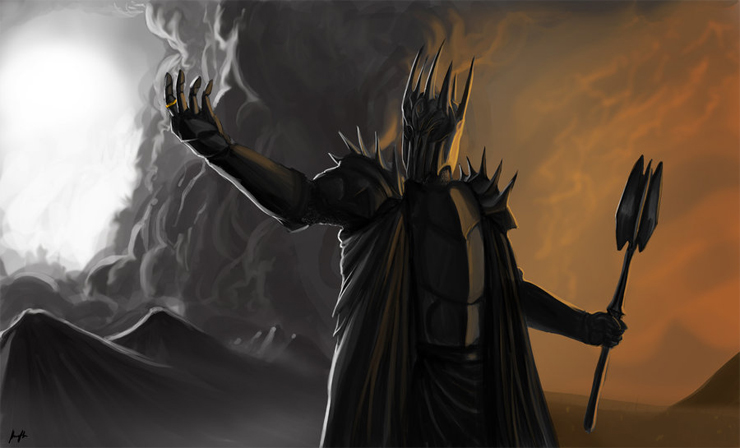
He’s been shunted off by those blowhard Númenóreans, and he’s not gonna take it anymore.
But wait! A reader fresh from a read of The Lord of the Rings might wonder: if Sauron’s already got his Ruling Ring, why can’t he just “cover all the lands in a second darkness” like Gandalf warns will happen if he gets it back in the Third Age? Doesn’t it make him way more powerful? It does. But here in the Second Age, Sauron still faces too much opposition to make a clean sweep of his foes. The Elves aren’t as few or as diminished (there are still some mighty Calaquendi among them, too!), and the Númenóreans themselves are a force to be reckoned with. Which is why he dares to reckon with them now.
In any case, Sauron’s blustering has reached Númenor, and Ar-Pharazôn isn’t having it. He heard that some other spoiled little boy has the toy he wants. That is, he wants to be the King of Totally All Men now. Ar-Pharazôn’s plan is not to try to destroy Sauron, but rather to subjugate him, to bring this so-called Dark Lord under his fealty. So he sails to Middle-earth with a massive fleet, goes ashore at the haven of Umbar and then marches inland with his army.
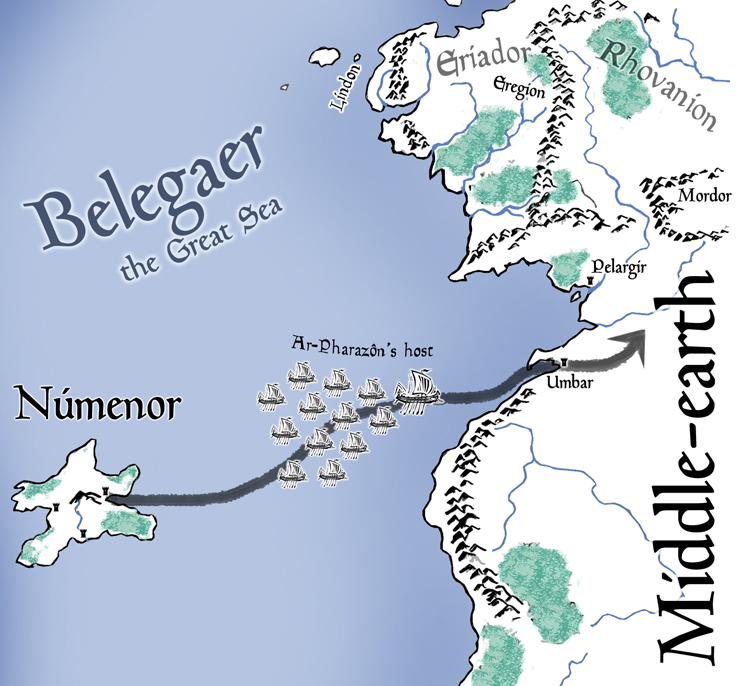
With narcissistic fanfare, he makes camp, sets down a throne on a big hill, and officially demands that Sauron come forth and swear fealty to him: To Ar-Pharazôn, king of this hill and, by extension, everything else.
If he was just like his old master, Sauron would dig in his heels and tell these upstart Númenóreans to bring it. He’d wait in his Dark Tower in Mordor and let the siege come. And then, if he failed and Ar-Pharazôn dragged him out in chains, then and only then would he would abase himself and do as the OG Dark Lord did. But no, Sauron doesn’t just run blindly with every move from Morgoth’s playbook. He’s got his own style. Hell, he’s the goddamned “master of shadows and of phantoms” and “a sorcerer of dread power,” has been since the First Age. Only now he’s the bigger fish.
Sauron is therefore proactive with his deception, not reactive. This isn’t the time for brute force. Númenóreans are no joke, so this is the time for silvered words and string-pulling. And knowing that if he sends even his biggest monsters out before him they’ll only get creamed, Sauron bids farewell to his Nazgûl and his minions, tells them not to wait up, and goes alone to Ar-Pharazôn’s hilltop camp. He’s using his fair disguise again, as he did with his ringmaking project some years back. He maxes out his Charisma score and swallows his pride, willing to let the sinister end justify the humiliating means.
Therefore he humbled himself before Ar-Pharazôn and smoothed his tongue; and men wondered, for all that he said seemed fair and wise.
Ar-Pharazôn has a big head but he’s not actually stupid. He can’t just trust spoken oaths and sail away with Sauron’s fealty only on paper. What’s to say the guy won’t renege as soon as the Númenórean ships are out of sight? Nope, better if Sauron goes under lock and key. Better if Ar-Pharazôn keeps a close eye on him personally, as a hostage. Bring the fox right on into the henhouse; that’s the ticket! Sauron only pretends to resist, since this presents the best opportunity to corrupt his enemies from within.
So here’s an obvious question: does Sauron have the One Ring with him when he’s taken to Númenor? Tolkien gives no definitive answer (only hints), neither here nor anywhere else, and so fans are often divided. But I am inclined to think he may have it. (1) He certainly wouldn’t want to be without it, (2) I don’t think Ar-Pharazôn knows about the Ring (he’s not exactly in the loop with the Elves of Eregion) and Sauron can probably render it unseen, and (3) most importantly, the Ring gives him greater mastery over the wills of others. How better to dominate? That was its whole point. But, to be clear, it’s not definitively known whether the Ring joins its master on this Second Age side quest.
Sauron is truly wowed by the sights of Númenor when he gets there. So this is the glorious land that the Valar gave to these teacher’s pets among Men! The island’s capital of Armenelos really impresses him. And that’s saying something, really. Sauron, long before gothing up and getting all ringsy, was one of the participants in the Music of the Ainur and witnessed the creation of the universe. Granted, he’s been Arda-bound for a long time now, but still, it shouldn’t be easy to astound him. Yet all it does is make him envious and hateful of the Children of Ilúvatar.
He keeps his malice under wraps, just as his master had in his parole days in Valinor. So honeyed are Sauron’s words and so foul is his wisdom that in only three years he goes from political hostage to (I assume) model prisoner and then finally to “closest to the secret counsels of the King.” Ar-Pharazôn really comes around on him. I mean, gosh, this Sauron really knows stuff. And soon all the councilors are in his sway, too.
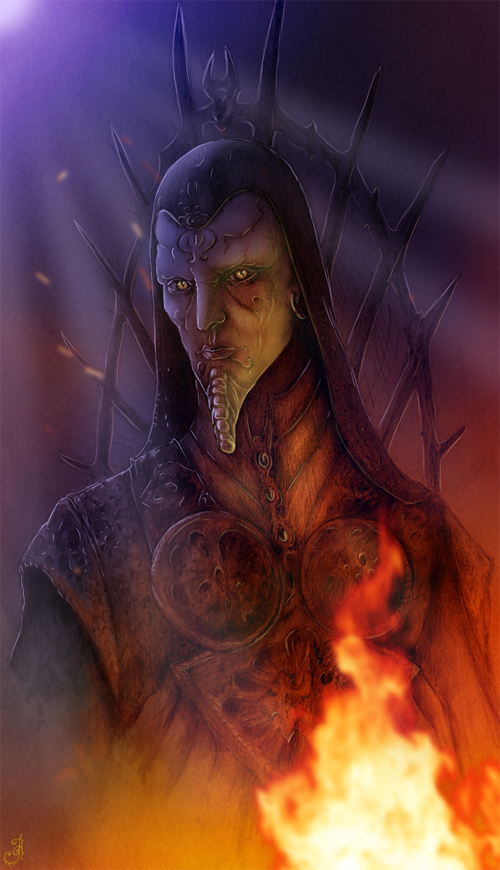
Well, most of them. One dude, Amandil of the Faithful, upstanding member of the house of Elros, renowned mariner and captain, and a childhood friend of Pharazôn, definitely doesn’t like what he’s seeing. Incidentally, this Amandil is the granddad of Isildur, who at this point in time is a strapping young lad in his 50s (which is young by Númenórean standards!)
Indeed, Amandil’s concerns for his country are well-founded, for that shadow that had fallen over Númenor years ago—the noontide that Manwë saw—really takes hold under Sauron’s devious administrations. The Maia’s evil and persuasive whispers begin a deep and seemingly irreversible cultural transformation. It’s gradual, this Sauron-tainted slippery slope that won’t truly incriminate him until it’s way too late. Amandil knows things are rotten, but he can’t advise his old friend Pharazôn anymore, not even if he tried. He’s been dismissed, you see; or to put it another way: the King’s stinking adviser fired him.
So what’s this change? For starters, many of the Faithful start to scoot when everyone starts calling them rebels—you know, as if they’re the traitors. Fortunately, there is that haven of Pelargir on Middle-earth where they lie low. Meanwhile, Sauron gainsays, bit by bit, all the wisdom of the Valar that has been passed down through the generations of Númenor. He points out that there are more lands out there that can be claimed. Should be claimed. And not just in the faraway realms to the east but also to the west, places of “wealth uncounted.” And sure, you’ll eventually reach the edge of all lands and come to an edge, a Darkness. But, Sauron explains, it’s from that Ancient Darkness that the world itself was made. And it is, in fact, worthy of worship—and there is a Lord within it who can use it to make yet more worlds. Wouldn’t Númenóreans be the perfect inheritors for such lands? Why be confined to just one pretty island? There can be so much more…
This really is the itch that Ar-Pharazôn wants to scratch, and so behind closed doors he digs for more about this mysterious Lord of the Darkness. See, Sauron knows what’s really going on. He knows that the Valar have deceived Men with their lies; that Eru Ilúvatar isn’t even real, just a “phantom” they made up to control the likes of Ar-Pharazôn and his people, and that the one who lies in the Darkness can be Men’s true savior. That one has a name, and it’s Melkor, Lord of All, Giver of Freedom, and he can “make you stronger than they.”
Melkor! Now, the name Morgoth may have been recorded, or be vaguely remembered by the loremasters of Númenor. He was that Dark Lord whom their ancestors fought against, alongside the host of the Valar more then three thousand years ago. But this…Melkor? A total unknown. Never heard of him before, which is what makes him so intriguing to Ar-Pharazôn. There’s no one around the King to connect the dots between that ousted tyrant of old and this awesome-sounding liberator in the Dark, whom the Valar have apparently been doing a cover-up on, clearly. It’s a conspiracy!
Sauron is too smart to make himself the alleged messiah. See, he’s just the messenger. Ar-Pharazôn falls for the ruse, and in secret he begins to worship the Dark itself and its Lord. The sacred mountain of Meneltarma with its shrine to Eru is now abandoned, and it becomes forbidden for anyone to even go up there. Sauron even tries to persuade the King to cut down that stupid White Tree as well, since it’s a symbol of the Eldar and the Valar. A symbol of oppression! Only superstition keeps Ar-Pharazôn from complying right away.
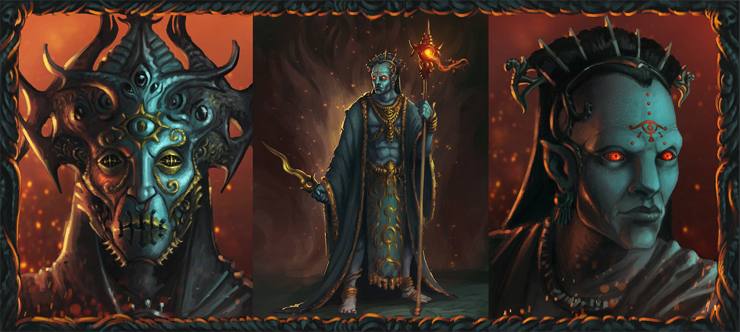
These dark days for the Faithful are only getting scarier. Amandil knows Sauron has it in for Nimloth, the White Tree, and so after telling his son and grandsons about their importance among the Faithful—and about the Two Trees of Valinor, to which Nimloth is a spiritual homage—Isildur is inspired to act. He goes to Armenelos in secret, now playing the part of a true rebel.
For Rings readers, it’s easy to define Isildur by that one screw-up he’s famous for, but the truth is, he’s a pretty heroic guy. He may falter one day there at Mount Doom, but so, too, will Frodo. Were it not for Isildur, a great many other good things would not have come to pass. And it starts here: Isildur sneaks unlawfully in the dark of night into the courts of the King, cuts a fruit from the White Tree, and barely escapes with his life after the guards discover and set upon him. He’s terribly wounded in the effort, but when Amandil plants the fruit in a secret place, it sprouts a new seedling of its own—along with some tiny shred hope for Númenor.
Discovering that some anonymous, I daresay Zorro-like outlaw has broken into the King’s courtyard, Ar-Pharazôn consents now to the destruction of the White Tree. Sauron then prompts the building of a great silver-domed temple, where the first thing consigned to the sacrificial flames is fair, white-barked Nimloth. Noxious smoke issues from this vile temple, lingering and fouling up the air of Armenelos for days before dispersing into the West.
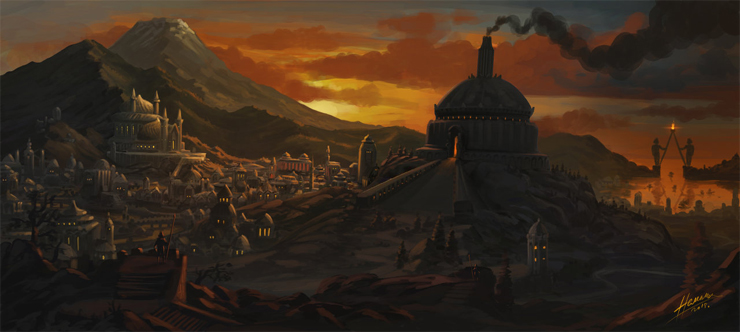
And then things get worse. With Sauron pulling the strings like some ignoble high priest, the sacrifices just keep on coming as Men beseech Melkor to “release them from Death.” It’s a parade of cruelty and torment as the bloody altar is fed. Most of the victims are Elf-friends condemned on trumped-up charges. Hate begets hate. It’s all-around ugly, as the wronged respond with violence, becoming outlaws in truth. If, for example, one of Sauron’s acolytes were to sacrifice the son of a longshoreman working on the docks of Armenelos who happened to be a member of the Faithful, it’s easy enough to imagine the grieving father responding with violence or plotting revenge. So then he‘s fed to the fire.
Surprisingly, the many blood sacrifices to Melkor don’t appear to be staving off death. Like, at all. Maybe the Númenóreans didn’t read the fine print on the “Melkor, Giver of Gifts” tracts that Sauron was handing out. And, in fact, sickness and pestilence creep into the land and old age comes sooner than it used to. What gives?! This, in turn, makes the people even more fearful of death; they become testy and blade-happy, turning on one another over the slightest infractions; killing one another. Sauron’s already got devoted servants actively going around “setting man against man,” scoffing at the wise, and probably spreading vicious office rumors, too!
Buy the Book
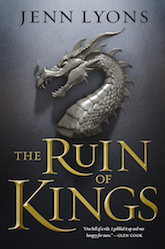

The Ruin of Kings
Within, Númenor is a mess. Its people are divided, hostile, and fearful. Yet, without, it’s never been so strong. Sauron turns out to be an excellent strategist, helping them expand their empire, advance their technology in war. It’s an arms race against…no one really, just themselves. The rich have grown richer, Ar-Pharazôn grows mightier still, and as his people continue to sail back to Middle-earth, they’re not just bullying and demanding tribute anymore. They’re hunting lesser Men, taking slaves, and sacrificing them in fortress temples. The legendary Sea-kings are a nightmare now, a people greatly feared, worse now than the former evil Men under Morgoth’s shadow.
Something’s got to give, right?
No one can challenge the King of Númenor, and nothing can stop the madness except, well, itself. Despite all the advice Ar-Pharazôn has taken from his new BFF and all the power it’s given him, there’s one thing even the erstwhile Sauron cannot stop: Ar-Pharazôn’s expiration date. The King feels age creeping up on him, and it makes him all the more paranoid, fearful, and angry. What to do? Well, Sauron has the only solution.
And he said: ‘The Valar have possessed themselves of the land where there is no death; and they lie to you concerning it, hiding it as best they may, because of their avarice, and their fear lest the Kings of Men should wrest from them the deathless realm and rule the world in their stead.’
In other words, the Valar have the antidote, so go and get it! Take it from them by force. Who is greater than Ar-Pharazôn, King of Kings, “mightiest of the sons of Earth, to whom Manwë alone can be compared, if even he”? You want something? Take it.
Sauron, assistant to the World’s Greatest Asshole, is really coming into his own, isn’t he? He knows that pride and machismo is going to win over this puppet king he’s got wrapped around his finger. He knows what Ar-Pharazôn with his cruel, tormented eyes wants to hear. He’s intoxicated with temptation and fear, and Sauron is giving him an out, a means to immortality. Why should Ar-Pharazôn not use his mighty kingdom to try and achieve it?
So Númenor begins preparations for war, this time against the Powers of Arda, those so-called Lords of the West.
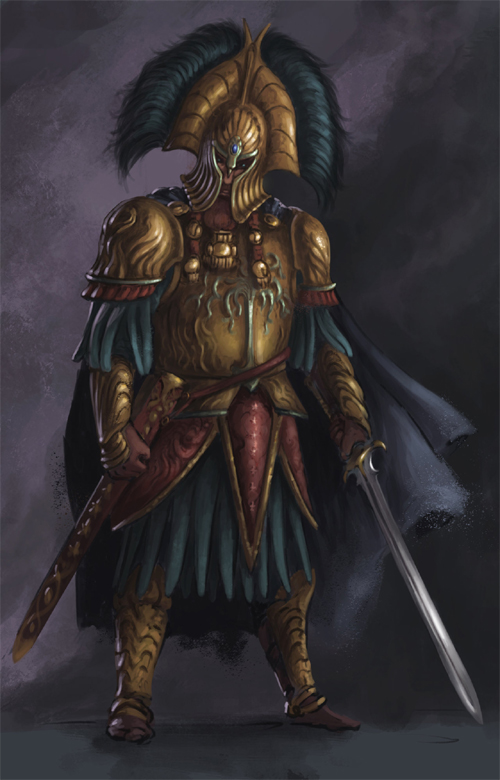
Amandil and the Faithful know this is rock bottom. Amandil consults with his son, Elendil, and decides to pull an Eärendil. That is, he’ll sail to the West—yes, breaking the ban himself but hoping to beseech the Valar on behalf of his people. He’ll suffer the penalty if he must, not just because Númenor has become such a dumpster fire but because he seeks deliverance from its spiritual cancer and the one who cultivated it. Sauron the Deceiver is the asshole spider in the middle of this web, and Men can’t overcome so great a foe on their own. And war aginst the Valar? Not only can that surely not succeed, but how screwed up is the world going to be even in the trying?
Amandil tells his son not to meddle with Ar-Pharazôn’s mustering but to gather what Faithful he can—prepare to depart quietly, prepare for exile, and be ready to give everything up. And as for Amandil himself, he won’t be missed; he’ll depart in secret, sail east and then circle around the island when no one’s looking. He does this, and departs with three companions as Eärendil once did…and then he exits the tale entirely. Does he make it to Valinor and simply get ignored, or does he not make it at all? All we’re told is:
Men could not a second time be saved by any such embassy, and for the treason of Númenor there was no easy absolving.
I, for one, like to think Ulmo plays a part in Amandil’s fate. Just because. Yet it’s supposed, but not confirmed, later in the text that he might have reached Valinor and given Manwë a helpful heads-up about what was coming (not that Manwë couldn’t already see, but it’s the thought that counts). But enough said about that. Elendil follows through. The Faithful salvage their lives, crowding into their ships with their families and heirlooms and whatever goods they can. But don’t miss this bit:
Many things there were of beauty and power, such as the Númenóreans had contrived in the days of their wisdom, vessels and jewels, and scrolls of lore written in scarlet and black. And Seven Stones they had, the gift of the Eldar; but in the ship of Isildur was guarded the young tree, the scion of Nimloth the Fair.
Aww yeah, our first official glimpse of the palantíri, which the Faithful have kept safe. These are very likely the stones made by Fëanor himself. They’re far from being Silmaril-level masterpieces (probably just something he worked up on some idle weekend back in his youth), but they’re incredible by Second Age standards and will be put to use on Middle-earth in days to come.
Under stormy skies and a hell of a lot of foreboding weather, Elendil and his boys, Isildur and Anárion, ready themselves. Nothing to see here, just a bunch of Elf-friends prepping their boats for some…fishing…with all their loved ones and best possessions aboard. Naturally!
Ar-Pharazôn, meanwhile, is still on track to pick a fight with the Valar. And every which way he looks, there are portents against it. Not only is the weather getting ominous, on some evenings huge clouds gather above the western horizon in the shape of goddamned eagles with lightning spitting down beneath their wings. Thunder and rain rocks the land. Manwë isn’t joking around, and he’s not even trying to be subtle. This is a really Bad Idea, Ar-Pharazôn.
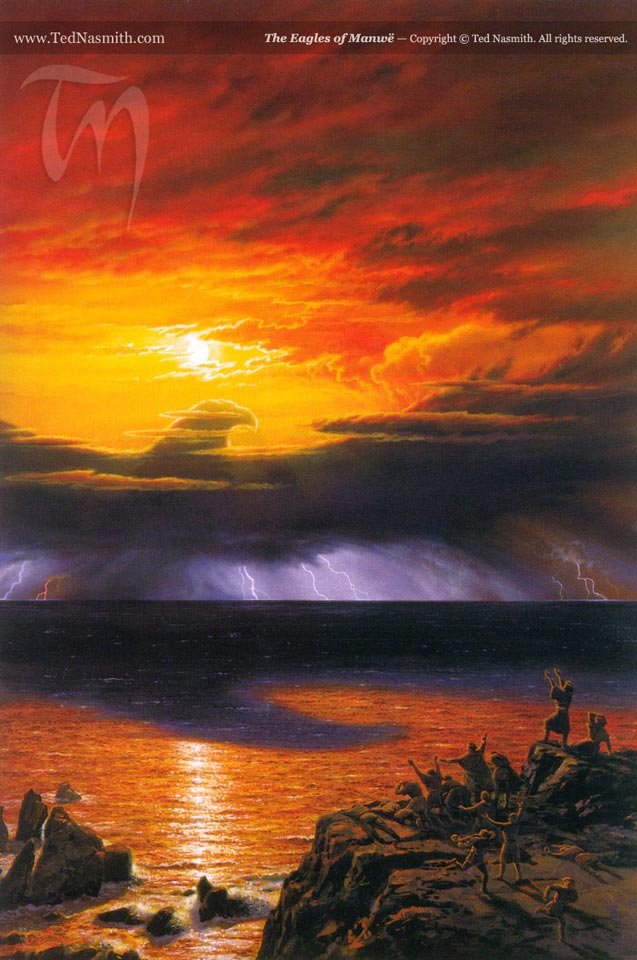
These omens reach a divided demographic. Some repent for a while, but many “harden their hearts” and shake their fists instead. It supports the King’s Men narrative to interpret the eagle-clouds as an attack.
‘The Lords of the West have plotted against us. They strike first. The next blow shall be ours!’ These words the King himself spoke, but they were devised by Sauron.
And who knows? Maybe like a certain cantina-loitering scoundrel, Manwë really does shoot first. Lightning intensifies and actually starts to skewer and slay assorted Númenóreans! No mere warning shots from the King of the Valar, but actual examples being made. Yikes! A bolt even hits the Temple to Melkor, breaking apart its dome. Sauron stands there, defiant and unharmed, “and in that hour men called him a god and did all that he would.” So when earthquakes start to rumble and volcanic smoke fumes out of the top of the mountain Meneltarma, the people just ignore it. Arm up! To war! It’s time for Ar-Pharazôn to set sail, lead his armada into the West, and make short work of their immortal antagonists.
As with the great battles in the Quenta Silmarillion, Tolkien’s writing in these moments is more than expositional: it’s poetry in paragraph form. Relish it, reread it, read it aloud if you dare. It’s so good.
In that time the fleets of the Númenóreans darkened the sea upon the west of the land, and they were like an archipelago of a thousand isles; their masts were as a forest upon the mountains, and their sails like a brooding cloud; and their banners were golden and black. And all things waited upon the word of Ar-Pharazôn; and Sauron withdrew into the inmost circle of the Temple, and men brought him victims to be burned.
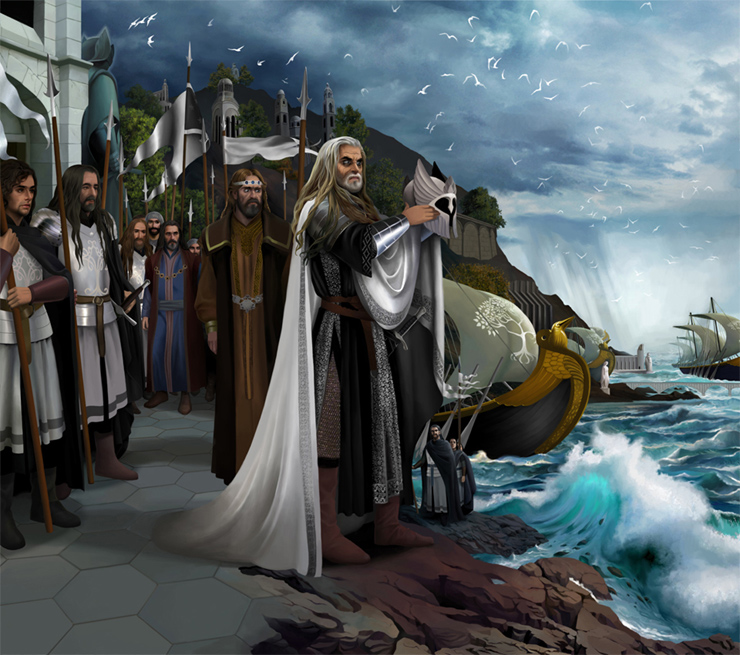
A host of actual Eagles now comes swooping out of the red-glowing west in their own aerial fleet, not actually attacking but presenting themselves like a final warning. Ar-Pharazôn hops into his own flagship, not taking the wheel like a defiant warrior-mariner but sitting upon a throne like the entitled megalomaniac he is. His trumpets blast, resounding across his fleet, and it “outrang the thunder.” Which…damn.
Insolent and imperious, Ar-Pharazôn in truth commands the mightiest force Middle-earth has ever known among Men; sure, Fingolfin’s armies of Noldor might have been stronger in their heyday, but this is the Second Age, and Númenor is the biggest fish in the bowl now—at least, this side of Eldamar.
We don’t get this bit until the end of the chapter—because Tolkien prefers a more dramatic chronology, but once Ar-Pharazôn does depart, Sauron actually sends his goons out to fetch Elendil. Why? So he can roast him on his altar! What a different story The Lord of the Rings might have been had he or his sons been barbecued right there in that temple. But no, Elendil evades capture, keeping his kids and his friends safe as they hide out on their ships on the eastern side of the island.
Meanwhile, it takes thousands of oars and a hell of a lot of elbow grease—with no help from Manwë!—to fill the sails of the Númenórean fleet but eventually they push their way past all the DO NOT ENTER buoys and the “deceits and snares” of the Shadowy Seas. They surge right around Tol Eressëa and the port of Avallónë, giving the Eldar living there a seriously sobering sight. The Ban of the Valar has been officially broken. Which…DAMN. Like hot-tempered Fëanor in ages past, for all his crimes, Ar-Pharazôn cannot be accused of being lily-livered. The dude’s got guts.
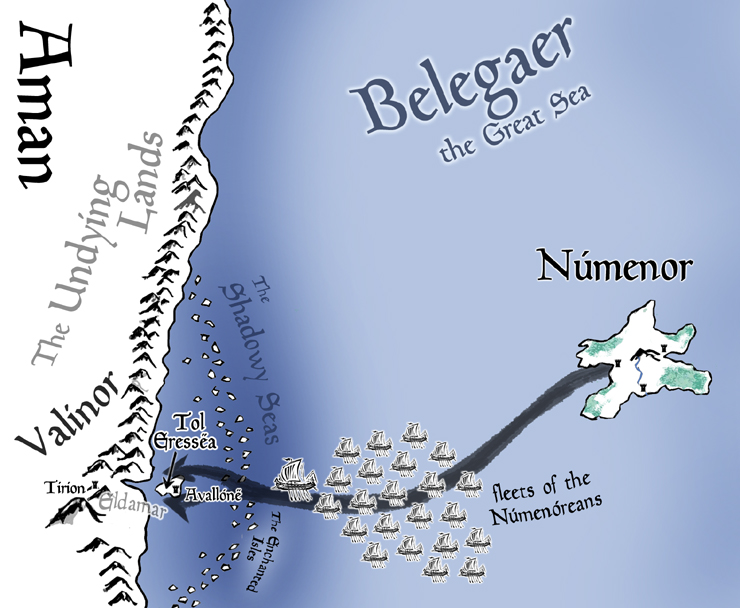
Then they drift up toward the shores of Aman itself. At last, the Blessed Realm, the Undying Lands. Valinor proper is really just a stone’s throw away now. Yet everything is utterly quiet and still and, to his credit, Ar-Pharazôn pauses for a moment, sobered by what he’s done. He might even have swallowed. He almost turns back.
His heart misgave him when he looked upon the soundless shores and saw Taniquetil shining, whiter than snow, colder than death, silent, immutable, terrible as the shadow of the light of Ilúvatar. But pride was now his master, and at last he left his ship and strode upon the shore, claiming the land for his own, if none should do battle for it.
Yeah, screw it. Ar-Pharazôn has a very good brain, and has the best words, and has the best people. He alone knows what’s best for Númenor.
And while his soldiers set up a war camp around the hill of Túna, that high green hill upon which the city of Tirion sits, the Eldar make themselves scarce. If Ar-Pharazôn himself had a moment of disquiet when he first drew near this land, so, too, do the Elves of the Undying Lands. It’s seriously awkward as hell now. This wasn’t ever supposed to happen! What are they, the Firstborn Children of Ilúvatar, supposed to do? This possibility wasn’t in any of Manwë’s or Varda’s memos. The Eldar used to go and visit their Númenórean friends on their splendiferous island and bring them fruit baskets and whatnot—even White Tree saplings and Fëanorean stones! But now Ar-Pharazôn’s gone and made it weird; they’re not supposed to be here.
All this time we’ve been keeping up with Númenor and haven’t read much about the Valar’s reactions. But for a moment, the narrator zooms out to the highest of POVs. Truth is, Ar-Pharazôn has placed the Valar in an especially difficult position. Yeah, they could probably trash this host from Númenor (they do have a Tulkas!) but that’s clearly never been a real option. And even if they did, the repercussions would be devastating on all levels. Not to mention the fact that the mighty Númenóreans could probably do some real damage here.
A lot of people like to give Manwë grief because he’s at the top of the hierarchy and it was ultimately his call—driven by mercy and compassion—that allowed Melkor to darken Valinor and trouble Middle-earth a second time. But this trespass of the Númenóreans—the descendants of those honorable Edain, for crying out loud—is a real grief to him. He knows that the land itself can burn these mortals up right quick and he’d hoped the ban would have kept them away. It hadn’t.
So what if the Valar, Maiar, and Eldar just backed off and let Ar-Pharazôn’s army traipse around for while? Couldn’t that be an option? Then they’d see exactly what living among the deathless will do the them. They’d be as “moths in a light too strong and steadfast,” just as Manwë’s messengers had explained to them. The bodies and spirits of Men just weren’t meant for that. It’d be lighting a candle at both ends, then tossing the whole thing right into an incinerator.
Manwë doesn’t want to make this call. For all his wisdom, neither he nor any of the Valar had anything to do with the creation of the Children of Ilúvatar. Moreover, Men in particular have always been different, and not subject to fate and the Music in quite the same way as all other denizens of Arda. Manwë knows more than anyone about the mind of his maker, which is why it’s been clear to him that simply giving the Númenóreans a beating isn’t what Ilúvatar would want. And at the end of the day, this call is above his pay grade. So he lifts up this conundrum to Eru himself: collectively, the “Valar laid down their government of Arda.”
And for all they know, maybe for good. I like how the Tolkien Professor, Corey Olsen, explains it:
In a sense, they’re submitting themselves to judgement. They’re just appealing this case to the higher court. And clearly submitting to Ilúvatar as well. Laying down their government. Now, apparently, Ilúvatar gives them their government back again. If this is a letter of resignation, Eru doesn’t accept it…
Well, Ilúvatar enacts his solution and it seems to surprise everyone. (Though I bet that know-it-all Mandos suspected and said nothing!) If the marred world and all its spiritual scar tissue has led to this—well, then the world must change. So Ilúvatar changes it. He doesn’t unmake or remake—not yet, not like the Second Music to which the Ainulindalë alluded. He just alters it, reshapes it.
It starts by pulling the plug. Opening the drain. A ginormous chasm beneath the sea is formed, and down swirls a heck of a lot of water. Even Ulmo might be freaking out for a minute there. His domain goes topsy turvy—even as Aman and Eressëa is removed from it almost entirely. Tethered still, maybe, but drifting apart. You’re going to need way more than a just a bigger boat to get there now.
Arda is flat no more! We can finally start using the word “global.” And up on the cold celestial highways, Eärendil has GOT to be slack-jawed at the sight of it. What in creation is going on down there?!

The whole of Ar-Pharazôn’s fleet, which is still in the Bay of Eldamar, gets sucked down into the maelstrom while Ilúvatar does his changing of the “fashion of the world.” They are donezo. While drowning in such a dramatic way is probably scary as hell, it’s not like they didn’t see the warning signs; moreover, staying put on Aman would have invited the gift of death very soon, anyway.
Those Númenóreans who’d already set foot on land, like Ar-Pharazôn himself, are not swallowed up by the watery abyss. They’re instead entombed by collapsing hills from around the mountain-walls of Eldamar. Entombed but not slain. They’re called the Caves of the Forgotten, where “it is said” they’ll remain, possibly in some kind of stasis, “until the Last Battle and the Day of Doom.” Which means we’re talking about whatever apocalypse will entail the actual end of Arda. Ar-Pharazôn is going to be there for quite a while. He has achieved a kind of immortality in the Undying Lands, after all. Ar-Pharazôn chose…poorly.
Now, things happen faster in this reshaping of Arda than they did at the sinking of Beleriand. The physical island of Númenor itself is utterly drowned—and we’re told this ruin occurs thirty-nine days after Ar-Pharazôn set out on his warpath. The land’s foundations are ripped apart, the mountain of Meneltarma erupts with smoke like a volcano, and the whole shebang—that microcosm of the best and the worst of Mankind—just slides down into the abyss. The Númenóreans themselves, encompassing a whole spectrum of good and evil, are thus ushered all the sooner to whatever Ilúvatar has planned for Men beyond the Circles of the World.
The last to witness the overwhelming waters is the Queen, who tries in vain to hurry to the top of the fire-spouting holy mountain. But it’s a no-go for her, too…
for the waters overtook her, and her cry was lost in the roaring of the wind.
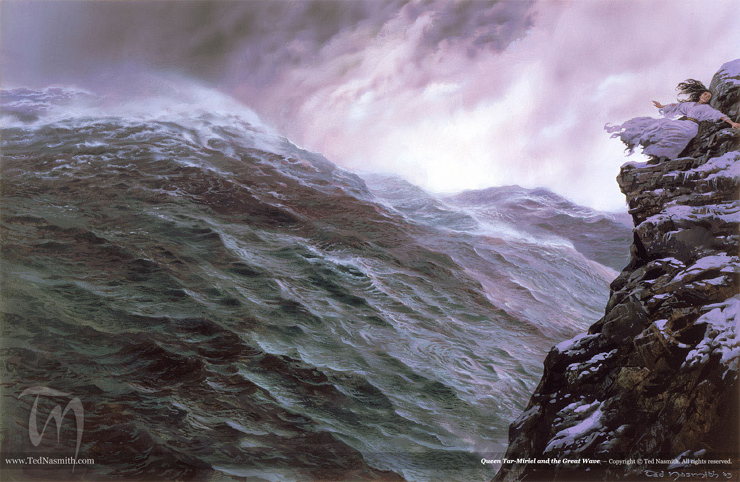
Many other good things are, of course, lost in the ruin of Númenor. Books, scrolls, treasures, tapestries, knowledge. Totally lost to the world, except maybe in the memory of those few who survive…
Which is Elendil and his sons Isildur and Anárion, and enough of the Faithful to fill nine ships. It’s a rough voyage and a perfect storm indeed that sees them reach the shores of Middle-earth safely, but only just. Even the coasts of Middle-earth are eroded by the geological changes happening across the globe. (Yes, globe!)
I bet Círdan the Shipwright was standing out on a jetty in Lindon at the time and had to move back a few steps as the surf washed in around him. Again. And we’re not just talking a slightly higher tide. Up and down Middle-earth’s western seaboard, the shorelines are redrawn. Seas intrude on the land, some isles are swallowed up, and new isles emerge, It’s a good time to be in the Middle-earth cartography business!
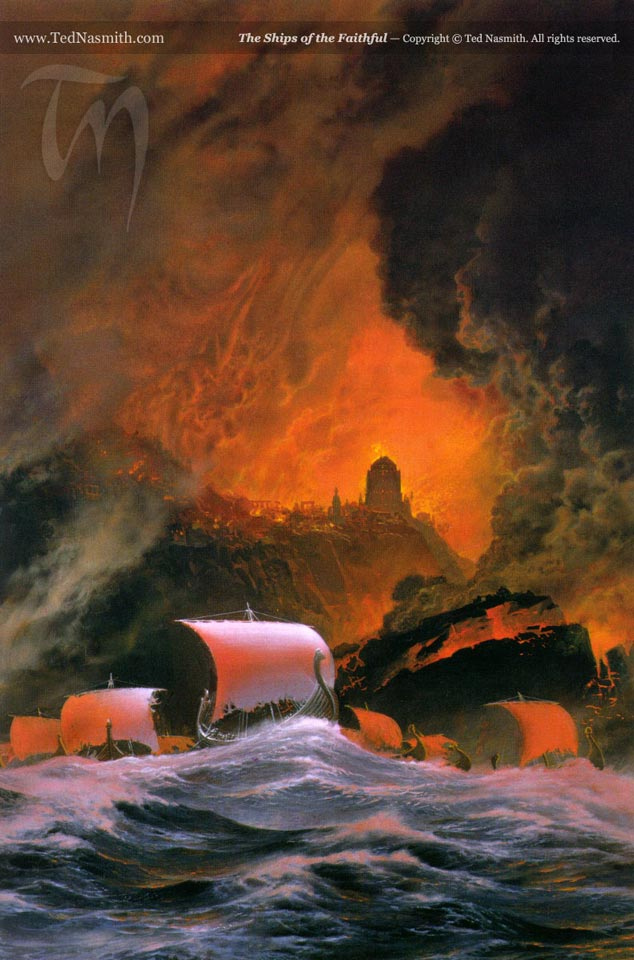
Of course, Elendil and his sons have a big part to play in what remains of the Second Age. They’ll found some kingdoms—not so great as Númenor was, but still pretty glorious by Middle-earth standards. They’ve certainly not seen the last of Sauron, either, who we last saw shutting himself up inside his Temple of doom on Númenor. Hah, sucks to be him! But oh, he’s a Maia, isn’t he? Can a collapsing island and drowning really do him in?
Nope. Remember that time when Morgoth changed out of his fair form and assumed his Dark Lord of Utumno get-up to impress Ungoliant, and then in fueling her up with some of his evil Valar power so she could suck out the light of the Two Trees, he actually lost the ability to change shapes ever again or go into spirit-form? Well, that’s kind of what happens to Sauron here. If he came to Númenor as a “hostage,” he probably had a Plan A or a Plan B in mind, depending on how well Operation Corruption went. But he definitely didn’t have a plan for what really ended up happening. I mean, yeah, it was a victory for him, but he also didn’t expect Ilúvatar to overreact so much and break the world. Which adds a little bitterness to his sweet triumph over the Númenóreans.
Yeah, it turns out Sauron’s the one who goes down with the ship, in a manner of speaking, and therefore “was robbed of that shape in which he had wrought so great an evil.” He goes all wraith-like, rising out of the maelstrom and soaring back to Middle-earth “as a shadow and a black wind.” So about the Ring of his, is he carrying it? In a letter, Tolkien addresses it without answering:
Though reduced to a ‘spirit of hatred borne on a dark wind’, I do not think one need boggle at this spirit carrying off the One Ring, upon which his power of dominating minds now largely depended.
Either way, he’s back in Mordor, picking up where he left off there, and now really putting his Ring to use again. He works up a new form, “an image of malice and hatred,” and it earns him his new Eye of Sauron the Terrible monicker.
And there we have it: the Akallabêth is complete, the downfallen have earned their name. When they turn the pages of history, when these days have all passed, will they read of Númenor with sadness, or for the seeds that it let grow?
Well, one little consolation: somewhere out in the Outer Void, Morgoth is still impotently drifting, and he knows nothing about the folly and ruin of Númenor. Dude doesn’t even know it existed in the first place. He doesn’t get to enjoy one little dark chuckle at the expense of Men. Boo-hoo.
And across the world, Men might still desire to travel ever westward, but no longer will they have the temptation to seek lands not made for them. Ilúvatar’s changed the whole ball of wax. In his letter to editor Milton Waldman, 1951, Tolkien explained the situation:
Thereafter there is no visible dwelling of the divine or immortal on earth. Valinor (or Paradise) and even Eressea are removed, remaining only in the memory of the earth. Men may sail now West, if they will, as far as they may, and come no nearer to Valinor or the Blessed Realm, but return only in the east and so back again; for the world is round, and finite, and a circle inescapable – save by death. Only the ‘immortals’, the lingering Elves, may still if they will, wearying of the circle of the world, take ship and find the ‘straight way’, and come to the ancient or True West, and be at peace.
There is now only a Straight Road, as the narrator calls it, by which Elves alone can sail to Valinor, and it’s not on anyone’s map. (Well, I bet Círdan’s marked it on one of his private maps.) It’s a watery path that leaves the curvature of the planet altogether but does not extend beyond Arda, for Aman still exists within the Circles of the World. As the years go by, Men put forth legends that by some grace or fortune it’s possible that some mortal mariners might chance upon the Straight Road, but if they ascend it even they will only get a glimpse of the deathless shores…before dying.
Yup. For Men (or former Elves who get counted among them, like Lúthien and Arwen!), the final fate is that great after-party Ilúvatar’s been putting together since forever.
In the next installment, we’ll turn at last to the final part of The Silmarillion, “Of the Rings of Power and the Third Age,” where Tolkien really lays all his cards on table and assumes you’ve already read the Extended Edition of his little Hobbit sequel.

Top image from “Ar-Pharazôn” by O.G. (steamy).
Jeff LaSala is as much a Rush fan as a Middle-earth fan, in case it isn’t obvious. Tolkien geekdom aside, Jeff wrote a Scribe Award–nominated D&D novel, produced some cyberpunk stories, and now works for Tor Books. He sometimes flits about on Twitter.










